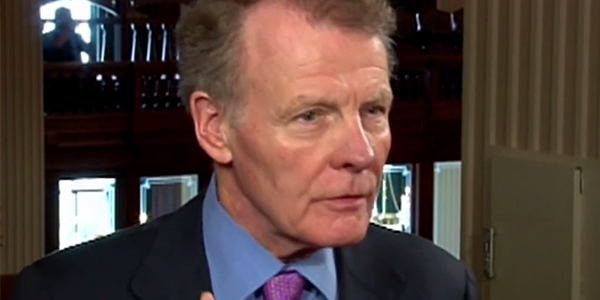Illinois electric customers filed a federal class action civil racketeering lawsuit Monday against Commonwealth Edison and state House Speaker Michael Madigan (D), seeking more than $450 million in damages and an order barring the longtime politician from participating in any electricity legislation related to ComEd or parent Exelon.
Plaintiffs’ attorney Stuart Chanen said ComEd’s agreement to pay a $200 million fine to settle criminal allegations does not prohibit customers from pursuing additional damages under the Racketeer Influenced and Corrupt Organizations Act (RICO). (See ComEd to Pay $200 Million in Bribery Scheme.)
Chanen also said that although Madigan was not identified by name in the ComEd case, it does not limit plaintiffs from seeking injunctive relief against the politician.
ComEd’s deferred prosecution agreement referred to Madigan as “Public Official A,” saying the utility paid the speaker of the House of Representatives bribes in return for legislation that increased the company’s earnings and bailed out its money-losing nuclear plants. (See How ComEd Got its Way with Ill. Legislature.)
“We filed our civil RICO case now to protect Illinois ratepayers from further damage by Michael Madigan — in both his capacity as speaker and as chair of the Democratic Party of Illinois — and also to get our clients back the damages they have suffered from ComEd’s and Madigan’s bribery scheme,” Chanen said.
The civil lawsuit alleges one count of racketeering under RICO’s civil provisions and one count of RICO conspiracy. It seeks several measures of relief, including:
- payment by the defendants of at least $450 million in damages to ComEd consumers, including $150 million in “ill-gotten gains” the utility admitted to in its deferred prosecution agreement and an additional $300 million under RICO’s treble damages provision;
- an injunction preventing Madigan from participating in legislative activities involving electricity matters affecting ComEd and Exelon;
- an injunction preventing Madigan from continuing to serve as chair the Democratic Party of Illinois and “running it as a corrupt organization”; and
- an injunction barring ComEd from continuing to charge zero-emission credits for Exelon’s Quad Cities and Clinton nuclear plants.
The lawsuit also names other prominent defendants, including: Anne Pramaggiore, former ComEd CEO; John Hooker, former ComEd executive vice president; Fidel Marquez, former ComEd senior vice president; Jay Doherty, the longtime president of the City Club of Chicago; and Michael R. Zalewski, former Chicago alderman.
In crafting the complaint, lawyers for the plaintiffs said they relied heavily on ComEd’s admissions in its the agreement with U.S. Attorney John Lausch. The complaint also emphasizes the $150 million in profits the Justice Department said ComEd earned in the alleged bribery scheme.
Attorney Patrick Giordano, another of the plaintiffs’ lawyers, said that because ComEd admitted to the bribery scheme, and the RICO statute includes a treble damages award to “punish racketeers,” company officials need to carefully weigh their options. “Pay back the $150 million to ratepayers now, or pay a joint and several $450 million judgment down the road,” Giordano said.
Paul Neilan, who has litigated cases against ComEd for 20 years, is also part of the plaintiffs’ legal team. Neilan filed a lawsuit in Cook County Circuit Court in 2013 challenging the 2011 Energy Infrastructure Modernization Act (EIMA), one of the bills that Madigan was allegedly bribed to support. The case was dismissed.
The deferred prosecution agreement said the EIMA allowed the utility to make billions in smart grid investments and switch to a formula ratemaking process to allow the recovery of costs more quickly.
“We knew that EIMA was bad for the ratepayers and obliterated any true regulation of ComEd as a utility,” Neilan said. “We also knew that Speaker Madigan had crammed the legislation through the General Assembly; we just didn’t know then that he did so as payback for numerous bribes ComEd had paid to his associates. But we know it now.”
ComEd and Madigan did not immediately respond to a request for comment.




